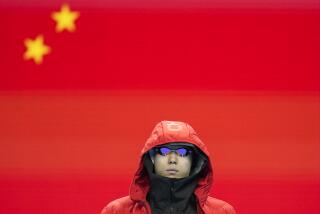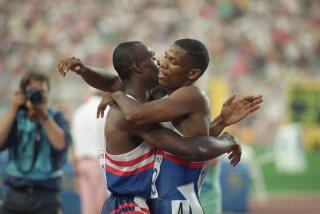IOC, WADA Team on Young Inquiry
- Share via
The International Olympic Committee and World Anti-Doping Agency confirmed Thursday they have formed a joint “inquiry commission” to investigate the case of sprinter Jerome Young, who tested positive in 1999 for a banned steroid but was cleared by U.S. track authorities to compete at the 2000 Sydney Olympics.
With the gold medals won in Sydney by the U.S. men’s 1,600-meter relay team at stake, WADA President Dick Pound said in a statement that the inquiry “will help bring transparency to this matter.”
Young tested positive for the banned steroid nandrolone in 1999 but, on appeal, was cleared by USA Track & Field to compete at the Games. USATF conducted the hearing and appeal in secret, depriving track’s worldwide governing body, the International Assn. of Athletics Federations, of a chance to review the case.
In cases involving athletes from other nations who had tested positive before the Sydney Games for nandrolone, the IAAF had acted to keep them out of those Olympics. Young acknowledged last Thursday that he had tested positive in 1999; the next day he drew a distinction, saying he had “never committed a doping offense.”
IOC President Jacques Rogge has indicated that the IOC views the matter with “extreme urgency” and stands ready to take “any measure or sanction,” and in a related matter, another member of the winning U.S. 1,600-meter team has joined in a seeming attempt to create distance from Young, who ran in the first two rounds of the relay.
In comments made at the close of the recently concluded world championships in Paris, Calvin Harrison, who ran the third leg in the relay finals in Sydney, said, “They’ll have to pry that medal out of my hands. Jerome ran in the rounds, but he didn’t win the gold medal.
“Me, Alvin [Harrison], Antonio [Pettigrew] and Michael [Johnson], we’re the ones who won the medal. We’re the ones who ran in the final. It wouldn’t be fair to take the medal away from us.”
Pettigrew had said last week, “I am not willing to give my medal back.”
Per Games protocol, Young and Angelo Taylor, who also ran in the early rounds, were also awarded gold when the four-man U.S. team, anchored by Johnson, easily won in the finals.
In a column published under his name last week in an English newspaper, the Daily Telegraph, Johnson also seemed to suggest that it ought to be Young -- and Young alone -- on the hook should the IOC order the forfeiture of medals.
“The question,” the column said, “is whether it is better to make the mistake of allowing a guilty athlete to compete or of banning an innocent athlete from competing. Both are unfair.
“In light of so much negative impact that the topic of drugs has had on this sport over the years, I believe that for the sake of [track and field] it is better to make the mistake of banning one innocent athlete than to allow a guilty athlete to compete, which would then deny several innocent athletes their right to fair competition.”
Meantime, Pound, a Canadian, has come under criticism in some track and Olympic circles, on allegations he is motivated by anti-American sentiment. He said Thursday in an interview, “I’m not anti-American, or anti-any country. But I certainly am anti-dopers and cheaters, wherever they may be.”
More to Read
Go beyond the scoreboard
Get the latest on L.A.'s teams in the daily Sports Report newsletter.
You may occasionally receive promotional content from the Los Angeles Times.






